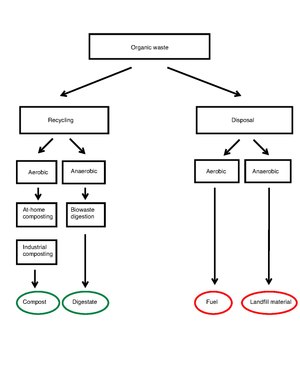Biodegradation
Biodegradation is the process by which organic substances are broken down by the enzymes produced by living organisms. The process of biodegradation can lead to complete mineralization, where the organic substance is completely broken down to inorganic substances such as carbon dioxide, water, and minerals. Biodegradation is a key process in the Earth's ecosystem as it helps in the recycling of materials, making nutrients available for new biological growth.
Mechanisms of Biodegradation
Biodegradation involves numerous mechanisms, primarily carried out by microorganisms such as bacteria, fungi, and other decomposer organisms. These organisms utilize organic substances as a source of energy or as a nutrient source, breaking them down into simpler compounds through metabolic processes. The mechanisms of biodegradation can be aerobic, requiring oxygen to proceed, or anaerobic, occurring in environments devoid of oxygen.
Aerobic Biodegradation
In aerobic biodegradation, microorganisms use oxygen to break down organic compounds into carbon dioxide, water, and energy. This process is efficient and fast, making it crucial for the decomposition of plant material, animal waste, and dead organisms in terrestrial and aquatic environments.
Anaerobic Biodegradation
Anaerobic biodegradation occurs in environments lacking oxygen, such as deep soils, sediments, and the guts of certain animals. In this process, microorganisms break down organic matter into methane, carbon dioxide, and other compounds. Anaerobic biodegradation is slower than aerobic processes but is essential for the decomposition of material in oxygen-poor environments.
Factors Affecting Biodegradation
Several factors influence the rate and extent of biodegradation, including:
- Temperature: Higher temperatures generally increase the rate of biodegradation by enhancing microbial activity. - pH: Most microorganisms prefer neutral to slightly alkaline conditions for optimal activity. - Oxygen availability: Oxygen is crucial for aerobic biodegradation, while anaerobic processes occur in its absence. - Presence of nutrients: Nutrients such as nitrogen and phosphorus are essential for microbial growth and activity. - Chemical structure of the substance: Simple compounds are usually more readily biodegradable than complex polymers.
Environmental Impact
Biodegradation plays a vital role in reducing the accumulation of waste materials in the environment, particularly those derived from petroleum and other non-renewable resources. However, not all materials are easily biodegradable, leading to environmental pollution and the accumulation of plastic waste, pesticides, and other persistent organic pollutants. Enhancing the biodegradability of synthetic materials and developing biodegradable alternatives are critical areas of research in environmental science and materials engineering.
Biodegradation and Pollution Control
Biodegradation processes are harnessed in various pollution control and waste management strategies, including composting, bioremediation, and the treatment of wastewater. Bioremediation, for example, uses microorganisms to degrade or detoxify pollutants in soil and water, offering an environmentally friendly alternative to conventional chemical and physical methods.
Conclusion
Biodegradation is a fundamental ecological process that contributes to the cycling of nutrients and the maintenance of environmental health. Understanding and enhancing biodegradation processes is crucial for sustainable waste management, pollution control, and the development of environmentally friendly materials.
This article is a environment-related stub. You can help WikiMD by expanding it!
Transform your life with W8MD's budget GLP-1 injections from $125.
W8MD offers a medical weight loss program to lose weight in Philadelphia. Our physician-supervised medical weight loss provides:
- Most insurances accepted or discounted self-pay rates. We will obtain insurance prior authorizations if needed.
- Generic GLP1 weight loss injections from $125 for the starting dose.
- Also offer prescription weight loss medications including Phentermine, Qsymia, Diethylpropion, Contrave etc.
NYC weight loss doctor appointments
Start your NYC weight loss journey today at our NYC medical weight loss and Philadelphia medical weight loss clinics.
- Call 718-946-5500 to lose weight in NYC or for medical weight loss in Philadelphia 215-676-2334.
- Tags:NYC medical weight loss, Philadelphia lose weight Zepbound NYC, Budget GLP1 weight loss injections, Wegovy Philadelphia, Wegovy NYC, Philadelphia medical weight loss, Brookly weight loss and Wegovy NYC
|
WikiMD's Wellness Encyclopedia |
| Let Food Be Thy Medicine Medicine Thy Food - Hippocrates |
Medical Disclaimer: WikiMD is not a substitute for professional medical advice. The information on WikiMD is provided as an information resource only, may be incorrect, outdated or misleading, and is not to be used or relied on for any diagnostic or treatment purposes. Please consult your health care provider before making any healthcare decisions or for guidance about a specific medical condition. WikiMD expressly disclaims responsibility, and shall have no liability, for any damages, loss, injury, or liability whatsoever suffered as a result of your reliance on the information contained in this site. By visiting this site you agree to the foregoing terms and conditions, which may from time to time be changed or supplemented by WikiMD. If you do not agree to the foregoing terms and conditions, you should not enter or use this site. See full disclaimer.
Credits:Most images are courtesy of Wikimedia commons, and templates, categories Wikipedia, licensed under CC BY SA or similar.
Contributors: Prab R. Tumpati, MD




